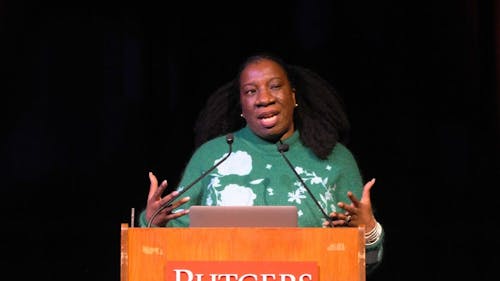Founder of #MeToo speaks at Rutgers

The founder of the highly influential #MeToo campaign and civil rights activist Tarana Burke gave a 2-hour presentation in front of more than 900 attendees last night at the College Avenue Gymnasium.
Burke first put together the phrase “Me Too” in 2007 to accompany her new nonprofit organization that supported victims of sexual assault and harassment, according to an NJ Advance Media article. Now, more than a decade later, she spoke to Rutgers about the development of the movement and the ongoing struggle against sexual violence and abuse.
A series of student performances preceded Burke’s presentation, including a poetry reading and stories from sexual assault survivors. The activist and Time's Person of the Year started her speech with the history of her activism and youth after being introduced by Vice Chancellor of Student Affairs Felicia McGinty.
“There's a lot of information out there about who I am and what this work is, so what I’d like to do is clarify some of that. Talk about who I am, how I started to do this work and how we got here,” Burke said.
The activist spoke about what the situation was like more than 20 years ago, when sexual assault was still a taboo topic that everyone, even she at one point, tried to ignore.
“I'm just one person. I'm one person who saw a problem and tried to ignore it. I tried my best to ignore it when it happened to me. I tried my best to ignore it when it happened to my family. I saw it breaking my community apart and I tried to ignore it," she said.
But Burke said that this is an issue that cannot be ignored. She described her various experiences as an educator and organizer, hearing dozens of stories from women and girls about their struggles with sexual abuse and violence. Her career as an organizer began when she realized how big the issue of assault was, how many women were affected by it and that change needed to happen.
“We never even came together as a community to discuss sexual violence, and what I knew and what I saw was we had a growing problem in our community, of epidemic proportions actually. This was tearing our community apart right in front of us and nobody was talking about it,” she said about her early years as an activist against sexual violence.
Burke retold the story of how #MeToo started. Even though she uttered these two words a decade earlier, she was excited that a mass movement focusing on her life’s work was starting.
On Oct. 15, 2017, actress Alyssa Milano made a tweet calling for women to reply to her post with the words “me too” if they had been the victims of sexual assault or abuse in the past, according to an Atlantic article. Within days, the words had spread to all kinds of social media platforms, with everyday women to high-profile actresses sharing their personal stories of harassment.
The movement quickly gained the attention of the media and the whole nation as accusations against lifelong abusers and men of power brought well known figures like Harvey Weinstein, Matt Lauer and Kevin Spacey into the spotlight. In December 2017, Time magazine named “The Silence Breakers” — men and women who helped start and perpetuate the #MeToo movement by sharing their stories — Person of The Year.
"The Silence Breakers" described #MeToo not as a vengeance movement and a way to tear down men, but as a movement of help. Sexual assault and violence weighs victims down and can alter their lives dramatically. When women say “Me Too,” they are telling the world about what happened to them and the struggles they have been through, without trying to attack someone else.
"One of the big misconceptions is that this is a movement about taking down powerful men, that it's a witch hunt. I’ve never had a person come to me and say, ‘I want to take down this person.’ They come and say ‘I need help,'" Burke said.
Burke is currently the senior director of Girls for Gender Equity, an organization that strives to promote the development of young girls and create a society where they are safe and treated equally. Burke plans to continue her fight against sexual assault and helping women overcome the challenges they face in today's society.
After her presentation, Burke sat down for a Q&A session where students heard her opinions on contemporary issues facing women and the future of the #MeToo movement. The event was organized by the Division of Student Affairs and the University Center for Women and Work. Student Affairs runs a campaign to promote sexual violence awareness and create a culture of positive change.



